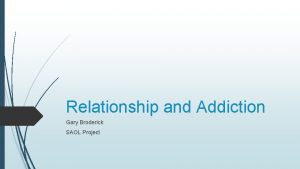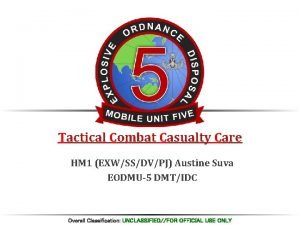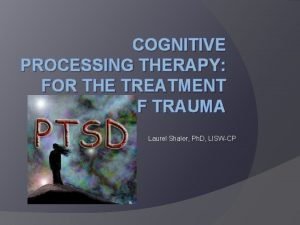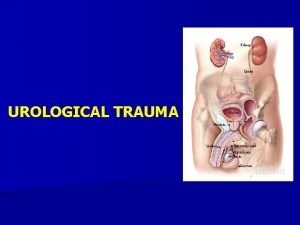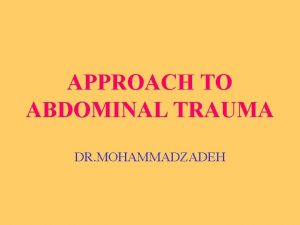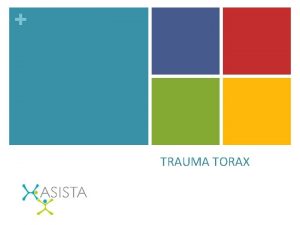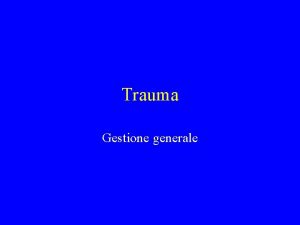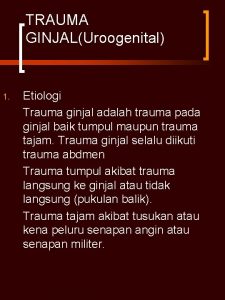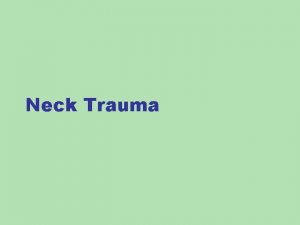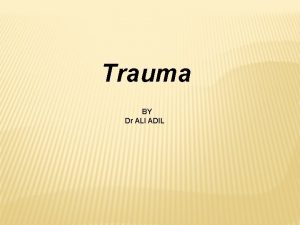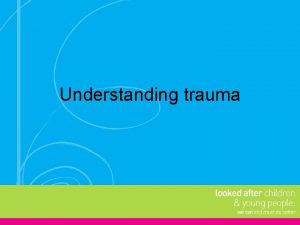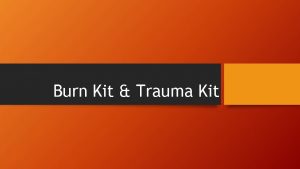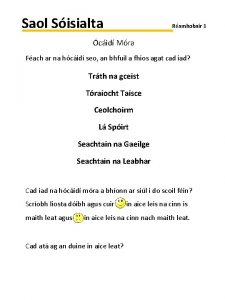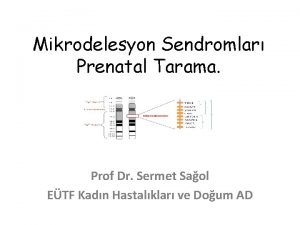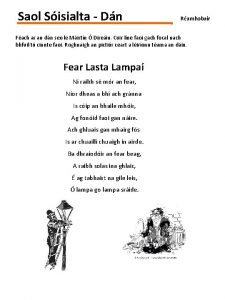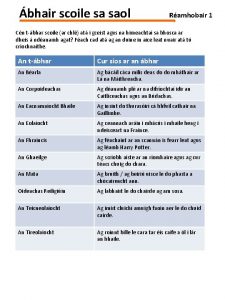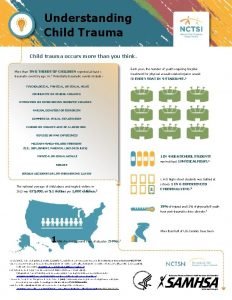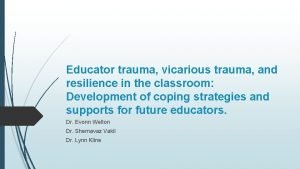SAOL March 2016 The impact of trauma on




























- Slides: 28

SAOL, March, 2016 The impact of trauma on children Rosaleen Mc. Elvaney

What do we mean by ‘trauma’? • Introduced to DSM in 3 rd edition (APA, 1980) Post Traumatic Stress Disorder (PTSD) • Normal reaction to an abnormal event

Post Traumatic Stress Disorder • Experience that is emotionally overwhelming • Research following 2 nd World War • Work with Vietnam Veterans

Complex trauma • chronic, prolonged exposure; entrapment; developmental (Herman, 1992) • “Children’s experiences of multiple traumatic events that occur within the caregiving system” (p. 5) • “Simultaneous or sequential occurrences of child maltreatment – including emotional abuse and neglect, sexual abuse, physical abuse, and witnessing domestic violence-that are chronic and begin in early childhood” (p. 5) • Cook et al. (eds) (2003). Complex trauma in children and adolescents. National child traumatic stress network www. nctsn. org •

Complex trauma - outcomes • extend beyond PTSD; “span multiple domains of impairment and include: • (a) self-regulatory, attachment, anxiety, and affective disorders in infancy and chidhood; • (b) addictions, aggression, social helplessness and eating disorders; • (c)dissociative, somataform, cardiovascular, metabolic, and immunological disorders; • (d) sexual disorders in adolescence and adulthood; and • (e) revictimization” (p. 5)

Domains of impairment • Attachment • Biology • Affect regulation • Dissociation • Behavioural control • Cognition • Self-concept

Developmental Trauma • Emphasis on impact as child develops • Development as cumulative • Impact as cumulative

Adverse Childhood Experiences (ACE) studies


Psychological impact – what influences it? • Developmental context: pre-trauma • Intrapersonal: self esteem; emotional regulation capacity; general coping capacity • Interpersonal: attachment; family & peer relationships • Community: school; sports; engagement • Society: attitudes; policy; legislation

Psychological impact • Nature of the trauma • Exposure to or experience of physical, sexual, emotional assault, abuse or neglect; acute or chronic • Individual response to the trauma • Meaning/making sense of; emotional reaction • Developmental context: post-trauma • Intrapersonal: feelings, thoughts, meaning • Interpersonal: responses of others and supports: • Community: involvement in co-curricular activities; how society responds

2 • Self esteem • Emotion regulation • Relational capacity

Self Esteem • Egocentricism: the world revolves around me • Bad things happening makes children feel bad about themselves • Vulnerable children are more at risk

Self Esteem • Egocentricism: It’s not your fault • Support child in developing competence • Positive messages: Reward child for achievements

Emotion regulation • Developmental tasks • Left brain/Right brain Thinking before action • Child overwhelmed with intense emotions • Stress hormones

Stan and Ute Lawrence, Canada, 1999 (cited in van der Kolk, 2013)

3 year old children – ‘normal’ & ‘extreme neglect’

Emotion regulation • Regulating FOR the child • Helping child to identify /recognise and express emotions in a safe way • Helping child to talk… • Distraction techniques • Right brian to right brain communication (Allan Schore) Attunement

Relational capacity • Impact on cognitive, social and emotional functioning • Reading social cues in relationships Reflective functioning: capacity to reflect on own emotional experience and experience in relation to others (Fonagy et al. , 1997)

Relational capacity • Learning to trust; taking risks • Separating out this person from that person Teaching reflective functioning

Research on how children overcome adversity • Problem-focused coping strategies (Everall et al. , 2006) • Relationships: supportive peer, parent and other relationships • Face up to the problem • Reflect on the problem • Creatively generate & plan possible solutions • Reach out for help • Future oriented behaviour: experimenting, taking charge


Post-traumatic growth • Kintsukuroi – more beautiful for having been broken • Stephen Joseph’s work: development of new capacities • Research findings: Compassion & empathy

What gets in the way of helping children? • Being open to the possibility… • Our own history…. • Not noticing, seeing, hearing… • Not being able to tolerate their distress… • Our beliefs about what is best…. • Each child is unique…in order to help them we must listen to them • We all have the capacity to know what’s right for us; trauma gets in the way; the challenge is finding the best way for this child


Forthcoming book… • London: Jessica Kingsley Publishers.


Thank you! Rosaleen. mcelvaney@dcu. ie
 Gary broderick
Gary broderick March march dabrowski
March march dabrowski Mist tccc
Mist tccc Abc worksheets cpt
Abc worksheets cpt Lời thề hippocrates
Lời thề hippocrates Vẽ hình chiếu đứng bằng cạnh của vật thể
Vẽ hình chiếu đứng bằng cạnh của vật thể Tư thế worm breton
Tư thế worm breton đại từ thay thế
đại từ thay thế Quá trình desamine hóa có thể tạo ra
Quá trình desamine hóa có thể tạo ra Khi nào hổ mẹ dạy hổ con săn mồi
Khi nào hổ mẹ dạy hổ con săn mồi Thế nào là mạng điện lắp đặt kiểu nổi
Thế nào là mạng điện lắp đặt kiểu nổi Các châu lục và đại dương trên thế giới
Các châu lục và đại dương trên thế giới Dot
Dot Bổ thể
Bổ thể Nguyên nhân của sự mỏi cơ sinh 8
Nguyên nhân của sự mỏi cơ sinh 8 Phản ứng thế ankan
Phản ứng thế ankan Thiếu nhi thế giới liên hoan
Thiếu nhi thế giới liên hoan Vẽ hình chiếu vuông góc của vật thể sau
Vẽ hình chiếu vuông góc của vật thể sau Chúa yêu trần thế alleluia
Chúa yêu trần thế alleluia điện thế nghỉ
điện thế nghỉ Một số thể thơ truyền thống
Một số thể thơ truyền thống Trời xanh đây là của chúng ta thể thơ
Trời xanh đây là của chúng ta thể thơ Hệ hô hấp
Hệ hô hấp Công thức tiính động năng
Công thức tiính động năng So nguyen to
So nguyen to Tỉ lệ cơ thể trẻ em
Tỉ lệ cơ thể trẻ em đặc điểm cơ thể của người tối cổ
đặc điểm cơ thể của người tối cổ Các châu lục và đại dương trên thế giới
Các châu lục và đại dương trên thế giới ưu thế lai là gì
ưu thế lai là gì
